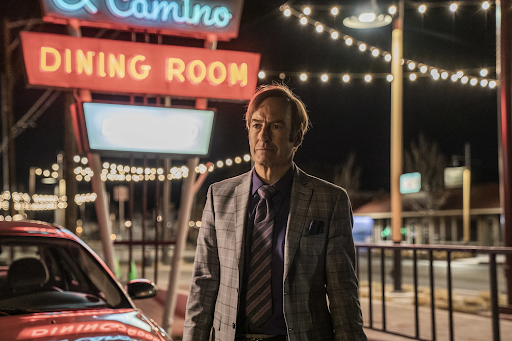Everyone who has looked for a television show to dive into has probably watched the epic series Breaking Bad. Walter and Jesse run a drug operation with the help of their lawyer, Saul Goodman. When I finished all five seasons of Breaking Bad, I was thirsty for more of the story. First, I watched El Camino, which is a continuation from Jesse’s point of view – and highly recommended. Then, I looked at Better Call Saul which gives a deep backstory and, at some points, is parallel to the universe of Breaking Bad from the perspective of Jimmy McGill, otherwise known as Saul Goodman. Recently, this show got attention at the Emmys. It got 53 nominations and won zero; I’m here to tell you why you should watch it anyway.
The beauty of Better Call Saul comes from both the normal things in Jimmy’s life that turn into major problems and the continuous connection to Breaking Bad. Because this story is placed chronologically before Walter and Jesse come into the picture the show is really focused on seeing how they crossed paths with Saul, Gus and Mike. The show not only focuses on Jimmy’s past, but also on Gus’s and Mike’s. These characters are only viewed from Walter’s surface-level perspective in Breaking Bad, so it is refreshing to see the directors develop such complicated characters beneath what we previously learned. On the other hand, it is great to be introduced to completely fresh characters like Chuck, Kim, Howard and Nacho, and to dive into their uniquely human characteristics that aren’t often shown in the series.
My favorite part of Better Call Saul is the cinematography of it all. Black and white scenes are utilized to show the future which is unique to only this show to effectively show the passage of time. The show uses a western color grade to show the scenes in Mexico which may not be all that unique, but is still a hallmark of the show. The directors also have a tendency to focus on inanimate objects making them the focus. The music also perfectly captures each scene. In both serious and frightening situations, the music is silent and nothing except dialogue can be heard adding to the suspense. The beautiful part is that at times the dialogue is the music and that conveys enough of a message for the audience. Often, music plays to end a scene reflecting the mood with its melody and, in some cases, the lyrics can show a character’s feelings or foreshadow future events.
If you’ve noticed, I haven’t given spoilers like I have in some of my other reviews. This is because I think they would ruin this show more than others since so much suspense is built in each season about a new conflict. If I were to give away those moments, it would diminish the watch. More importantly, we have a current watcher of Better Call Saul featured on this review. Jeremy will give his insight as someone who is going through the show as we write this, so I’m interested to see what he thinks about it so far. Here’s Jeremy!
Thanks, Colin. Currently, I’m at the beginning of the third season and so far the show has been a masterclass on character and storyline development. Granted, the director had access to Breaking Bad’s content, but as a viewer having not watched Breaking Bad, I was pulled into Jimmy’s journey.
To date (and I expect through the rest of the show), he’s portrayed as a flawed person with a desire to prove himself to Chuck. The cyclical storyline serves as a testament to this: He tries to prove himself, cheats in some way to get there and inevitably tries again when it falls short. On a production level, the cinematography — as Colin mentioned — is simple, but engaging. Supporting this is the dialogue which has excellent content and delivery by all the actors.
To summarize my experience in one sentence, I enjoyed the humanity of it all. The unknowns, the frustrations of his relationships, his realization of his idol’s imperfection, his attempts at honest success and his relapses into dishonesty – all of it capture the human experience in a way few other shows have for me.
As I was watching it with my parents, my Mom and I became frustrated at how many mistakes Jimmy made; the repetitive cycle of hope and reform turning to relapse and sadness became annoying at times. I see what the writers and directors were going for, but I feel that things could have been a bit more dynamic (especially by the latter half of the second season and the beginning of the third). Many of the shows I’ve seen, if they’re over three seasons, have storylines fizzle out. I’m never sure if it’s a change within the writing staff or a change of directors, but things never seem to have the same impact as the first season. I would watch out for that in this show (although, it’s possible that they may redeem themselves later). Despite this criticism, I realized that it did serve a purpose. Jimmy’s character being able to engender these emotions is a testament to it. It’s a testament to the humanity of cyclical failure and success; I’m excited to see if Jimmy’s cycle is slowly spiraling upwards, or careening downwards for the worse.


